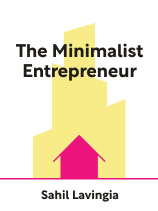

This article is an excerpt from the Shortform book guide to "The Minimalist Entrepreneur" by Sahil Lavingia. Shortform has the world's best summaries and analyses of books you should be reading.
Like this article? Sign up for a free trial here.
What is the main purpose of business? What should the long-term goal of your company be?
In The Minimalist Entrepreneur, Sahil Lavingia addresses the long-term goal of a minimalist business. He reminds readers that business isn’t about getting rich—it’s about creating a satisfying life.
Keep reading to learn what the sole purpose of a business is.
Improve Your Life and the World
The main purpose of business, Lavingia says, should be about making the world and your own life better. Working extreme hours is self-defeating. So he says you should use your financial success to create “time affluence,” or a wealth of free time, so you can enjoy life. He gives a few pieces of advice for using your financial assets to create the more valuable assets of time and life satisfaction.
(Shortform note: Lavingia’s advice aligns with what psychologists know about happiness and life satisfaction. In Happier, No Matter What, positive psychologist Tal Ben-Shahar says that time affluence is a better predictor of well-being than material affluence. He says being time-affluent would mean feeling like you have enough time to engage in activities that are meaningful and enjoyable, rather than being constantly stressed and rushed. Generating more leisure time means you can’t make money your first priority, but it doesn’t mean you can’t still be successful.)
As your business grows and prospers, Lavingia suggests you think about automating and outsourcing anything you can, to free up time for yourself. (Shortform note: The 4-Hour Workweek suggests hiring virtual assistants for tasks that can be delegated. Since VAs work remotely, you can hire someone from anywhere in the world. This can have a financial advantage because currency conversion rates mean labor costs are lower in countries like India and China.) Sometimes spending money to create free time is well worth the tradeoff. Then, he says, you can use that free time to go back to being a creator and work on projects you love, whether it’s something you want to do for pleasure or starting another business. In this way, your business should not trap you, but free you.
He also suggests using your financial success to contribute and give back to the world, by supporting other entrepreneurs, social justice and environmental causes, or whatever you care most about. In 2020, as a response to racial justice issues in the US, Lavingia decided he wanted to invest in a Black-owned tech startup. He posted this on his social media sites, inviting Black entrepreneurs to contact him. He received over 200 emails in response and ended up investing in four of these startups. (Shortform note: This is called “angel investing.” It’s different from venture capital because an angel investor uses their personal funds to invest, rather than an investment fund. Angel investors also typically expect a lower return on their investment than venture capitalists.)
And finally, Lavingia says you should always keep in focus your original purpose of wanting to help people in a community you care about. You’ll likely want to embark on a new endeavor at some point. When you do, take some time to reflect on why you originally wanted to solve the problem you did, why you align with the community you serve, and why you want to do the next thing. This will bring you back to your driving purpose and help propel you forward in a way that will continue to make your life fulfilling.
Giving Is Receiving
Joshua Fields Millburn and Ryan Nicodemus, known as “the minimalists,” travel the world helping people create simpler, more meaningful lives with fewer material possessions. In their best-selling book Minimalism, they say part of a balanced life is contributing to the world and to others. They say getting personally involved with charitable causes is more rewarding than simply writing a check, and they offer some advice for ways to get involved and give back to the world.
- Visit volunteermatch.org, where you can get matched with causes you can contribute to by volunteering. Try out different things until you find what suits you best.
- Consider starting your own charitable organization.
- Mentor someone who could benefit from your guidance.
Since you’ll already have a successful business by this point, think about how you might connect that to your plan for giving back. For example, Lavingia suggests helping new entrepreneurs by sharing your strategies and possibly offering start-up funds. Whatever you decide to do to contribute to the world, Millburn and Nicodemus say giving will help you grow and give meaning to your life.

———End of Preview———
Like what you just read? Read the rest of the world's best book summary and analysis of Sahil Lavingia's "The Minimalist Entrepreneur" at Shortform.
Here's what you'll find in our full The Minimalist Entrepreneur summary:
- Detailed advice for starting your own business without venture capital
- How to run your business sustainably and contribute to the world
- Why you don’t need to spend any money on marketing






